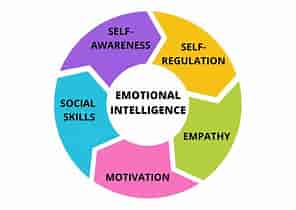Introduction
Emotional intelligence (EI), often referred to as EQ (Emotional Quotient), is a crucial attribute for effective leadership. Unlike traditional intelligence (IQ), which measures cognitive abilities, EI focuses on the ability to understand and manage emotions—both one’s own and those of others. This article explores the importance of emotional intelligence in leadership, its key components, and how it contributes to successful leadership practices.
1. Understanding Emotional Intelligence
Definition: Emotional intelligence is the ability to recognize, understand, and manage our own emotions, while also recognizing, understanding, and influencing the emotions of others.
Components of EI:
- Self-Awareness: Recognizing and understanding one’s own emotions and their impact on others.
- Self-Regulation: Managing or redirecting disruptive emotions and impulses.
- Motivation: Being driven to achieve for the sake of achievement.
- Empathy: Recognizing and understanding the emotions of others.
- Social Skills: Managing relationships to move people in desired directions.
2. The Importance of EI in Leadership
Building Trust and Respect: Leaders with high emotional intelligence are better at building trust and respect among their team members. They are approachable, listen actively, and respond empathetically, fostering an environment of mutual respect and trust.
Effective Communication: EI enables leaders to communicate more effectively. They can convey their messages clearly, understand the emotional tone of the conversation, and respond appropriately, ensuring that their communication is both impactful and considerate.
Conflict Resolution: Leaders with strong EI skills are adept at navigating conflicts. They can understand the underlying emotions driving the conflict, address the concerns of all parties involved, and find solutions that are acceptable to everyone.
Employee Engagement and Motivation: Emotionally intelligent leaders are skilled at recognizing and addressing the emotional needs of their employees. They can inspire and motivate their team by connecting on an emotional level, understanding their motivations, and providing the support needed to achieve their goals.
Adaptability and Flexibility: High EI allows leaders to be more adaptable and flexible in the face of change. They can manage their own emotions during times of uncertainty and provide stability and reassurance to their team.
3. Developing Emotional Intelligence
Self-Reflection: Regular self-reflection helps leaders gain a deeper understanding of their own emotions and how they affect their behavior and decision-making. This can be achieved through journaling, meditation, or seeking feedback from others.
Mindfulness Practices: Mindfulness and meditation practices can help leaders become more aware of their emotions and improve their ability to regulate them.
Empathy Training: Developing empathy involves actively listening to others, trying to understand their perspective, and responding with compassion. This can be cultivated through role-playing exercises, mentoring, and coaching.
Continuous Learning: Leaders should seek opportunities for continuous learning and development in EI. This can include attending workshops, reading books on emotional intelligence, and engaging in professional coaching.
4. Case Studies and Examples
Steve Jobs: Despite his reputation for being demanding, Steve Jobs exhibited high levels of emotional intelligence, particularly in his ability to inspire and motivate his team, leading to groundbreaking innovations at Apple.
Satya Nadella: As the CEO of Microsoft, Satya Nadella is known for his empathetic leadership style, which has transformed the company’s culture and driven significant growth and innovation.
Oprah Winfrey: Oprah Winfrey’s success as a media mogul is partly attributed to her high emotional intelligence, particularly her ability to connect with her audience on an emotional level.
Conclusion
Emotional intelligence is a fundamental quality for effective leadership. It enables leaders to build strong relationships, communicate effectively, resolve conflicts, and inspire their teams. By developing and enhancing their emotional intelligence, leaders can create a positive and productive work environment, driving both personal and organizational success. As the business landscape continues to evolve, the importance of EI in leadership will only continue to grow, making it an essential skill for current and future leaders.





Leave a Reply